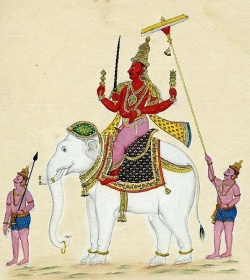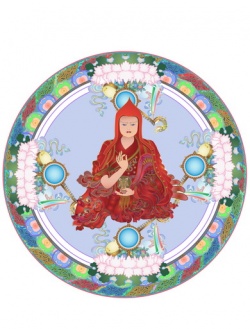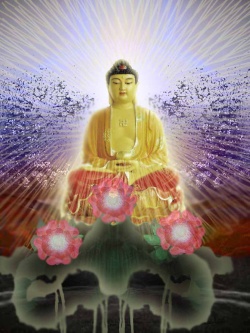Indra
Indra (Skt.; Tib. དབང་པོ་, Wyl. dbang po) or Shakra (Skt. Śakra; Tib. བརྒྱ་སྦྱིན་, Wyl. brgya sbyin) — one of the principal gods of Hinduism. According to Buddhist cosmology, Indra resides in the Heaven of the Thirty-Three, which is one of the six heavens of the desire realm. In the Buddhist scriptures he is also sometimes presented as a Dharma protector.
Source
A major deva, originally the Hindu sky god.
"He of a hundred sacrifices"; (Maha-1,CCXXX)
Indra is the king of the lesser gods, known as the Devas. He is the son of Aditi and sage Kashyapa, and is one of the Adityas. His capital city is Amaravathi, in the heavens. He posseses an elephant known as Iyravata and a divine cow named Kamadhenu.
Indra is the principal deity of the Rig Veda. Most of the hymns in this primary text of Hinduism are addressed to him. Sometimes he is addressed as a dual Mitra-Indra. He is capable of granting minor boons to his devotees. He is not directly worshipped, but often invoked in sacrifices.
It is said that Indra is not one person, but rather the generic name of the king of heaven. Upon performing certain sacrifices or penances, a mortal can ascend to heaven and attain the position of the king of heaven. His reign shall last till another person becomes eligible for this position.
In the Rig Veda, Indra is depicted as the most powerful god. However, in latter texts, his importance has been considerably diminished. He is no longer all-powerful, instead he is subject to the overlordship of the supreme trinity of Shiva, Vishnu and Brahma.
Indra (इन्द्र): King of the Gods. The chief deity of the Rigveda, the god of weather and war as well as Lord of Svargaloka in Hinduism.
Indra, also known as Śakra in the Vedas, is the leader of the Devas or gods and the lord of Svargaloka or heaven in the Hindu religion. He is the god of rain and thunderstorms.
He wields a lightning thunderbolt known as vajra and rides on a white elephant known as Airavata. Indra is the supreme deity and is the twin brother of Agni and is also mentioned as an Āditya, son of Aditi. His home is situated on Mount Meru in the heaven. He has many epithets, notably vṛṣan the bull, and vṛtrahan, slayer of Vṛtra, Meghavahana "the one who rides the clouds" and Devapati "the lord of gods or devas".
Indra appears as the name of a daeva in Zoroastrianism, while his epithet, Verethragna, appears as a god of victory. Indra is also called Śakra frequently in the Vedas and in Buddhism (Pali: Sakka). He is known in Burmese as သိကြားမင်း, pronounced: [ðadʑá mɪ́ɴ]; in Thai as พระอินทร์ Phra In, in Malay as Indera, in Telugu as ఇంద్రుడు Indrudu, in Tamil as இந்திரன் Inthiran, Chinese as 帝释天 Dìshìtiān, and in Japanese as 帝釈天 Taishakuten. He is celebrated as a demiurge who pushes up the sky, releases Ushas (dawn) from the Vala cave, and slays Vṛtra; both latter actions are central to the Soma sacrifice. He is associated with Vajrapani - the Chief Dharmapala or Defender and Protector of the Buddha, Dharma and Sangha who embodies the power of the Five Dhyani Buddhas.
Source
Indra, also known as Śakra in the Vedas, is the leader of the Devas or demi gods and the lord of Svargaloka or heaven in the Hindu religion. He is the god of rain and thunderstorms. He wields a lightning thunderbolt known as vajra and rides on a white elephant known as Airavata. Indra is the supreme deity and is the twin brother of Agni and is also mentioned as an Āditya, son of Aditi. His home is situated on Mount Meru in the heaven. He has many epithets, notably vṛṣan the bull, and vṛtrahan, slayer of Vṛtra, Meghavahana "the one who rides the clouds" and Devapati "the lord of gods or devas". Indra appears as the name of a daeva in Zoroastrianism (but please note that word Indra can be used in general sense as a leader, either of devatas or asuras), while his epithet, Verethragna, appears as a god of victory. Indra is also called Śakra frequently in the Vedas and in Buddhism (Pali: Sakka). He is known in Burmese as သိကြားမင်း, pronounced: [ðadʑá mɪ́ɴ]; in Thai as พระอินทร์ Phra In, in Khmer as ព្រះឥន្ទ្រា pronounced (preah ʔəntraa], in Malay as Indera, in Telugu as ఇంద్రుడు Indrudu, in Tamil as இந்திரன் Inthiran, Chinese as 帝释天 Dìshìtiān, and in Japanese as 帝釈天 Taishakuten. He is celebrated as a demiurge who pushes up the sky, releases Ushas (dawn) from the Vala cave, and slays Vṛtra; both latter actions are central to the Soma sacrifice. He is associated with Vajrapani - the Chief Dharmapala or Defender and Protector of the Buddha, Dharma and Sangha who embodies the power of the Five Dhyani Buddhas. On the other hand, he also commits many kinds of mischief (kilbiṣa) for which he is sometimes punished. In Puranic mythology, Indra is bestowed with a heroic and almost brash and amorous character at times, even as his reputation and role diminished in later Hinduism with the rise of the Trimurti.
Source
Indra, Śakra is the leader of the Devas or gods and the lord of Svargaloka or heaven in the Hindu religion. He is the god of rain and thunderstorms. He wields a lightning thunderbolt known as vajra and rides on a white elephant known as Airavata. Indra is one of the chief deities and is the twin brother of Agni, said to be born of Dyaus Pitar (Father Heaven) and Prithvi Mata (Mother Earth). He is also mentioned as an Aditya, son of Aditi. His home is situated on Mount Meru in the heaven. He has many epithets, notably vṛṣan the bull, and vṛtrahan, slayer of Vṛtra, Meghavahana "the one who rides the clouds" and Devapati "the lord of gods or devas". Indra appears as the name of a Daeva in the Zoroastrian religion, while his epithet Verethragna appears as a god of victory.


